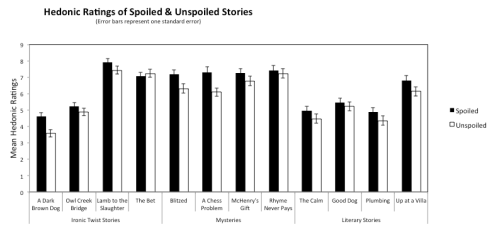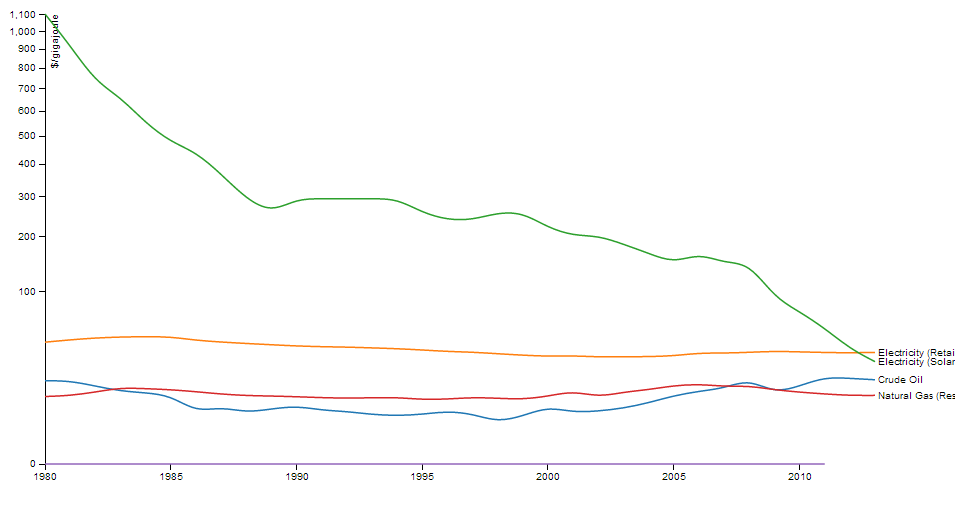Puzzle – Do Spoilers Matter?
Research looking into the enjoyment of short stories found that reading a ‘spoiler’ beforehand tended to increase enjoyment. That seems quite possible, but the strangest part is that it holds even for mystery or ironic-twist stories. They even have a chart with error bars, which looks pretty compelling (click for big):
So, you’ll generally enjoy all stories you read (or presumably consume in any medium) more if you read about the ending first.
The question, then: how can you justify not doing this?
Video – Omlette
Here’s a really lovely short (2’30”) animation about a dog and an omlette. If you’re having a hard day, I particularly recommend it.
Audio – Beethoven wants you to play faster
When Beethoven eventually got his hands on a metronome, he marked up symphonies with tempos that nobody can quite believe he really meant, and which are pretty much entirely disregarded. This excellent Radiolab podcast investigates. (The forced conversational ‘style’ gets a little irritating, but the demonstration at the end is fantastic).
Links – Race Against The Machine
Our old friend the Invisible Hand guides us to make work more efficient with technology: robots replace humans on production lines, computer work becomes automated, cars and vacuum cleaners operate themselves, and productivity increases. Brilliant.
From the Luddites on, people have been fighting this change to defend their old jobs, but with hindsight we can say they were mistaken, as prosperity has increased, every time, and will continue to do so.
Or will it?!
Despite the apparent historic benefits, it’s still hard to imagine this trend continuing indefinitely and remaining benevolent.
Now, one can imagine some sort of desirable end point, in which (say) solar power becomes incredibly cheap:
… and robots / algorithms are able to do everything humans don’t want to do, and everything is wonderful and everyone is happy.
Of course, quite how you would run such a society isn’t entirely clear, and as Voltaire points out, work isn’t only about earning money:
Work spares us from three evils: boredom, vice, and need
But of more concern right now is how we organise society as we transition towards that end-point. In particular, it seems reasonable to suggest that automation of jobs will tend to increase inequality, as (in a simplistic model), the few that own the robots / server farms reap all the rewards of that automated labour while everyone else loses their jobs.
In case you need reminding, inequality is bad for almost everyone. By the way, a concise point on this topic made by Nick Hanauer in 2011:
If the average American family still got the same share of income they earned in 1980, they would have an astounding $13,000 more in their pockets a year. It’s worth pausing to consider what our economy would be like today if middle-class consumers had that additional income to spend.
Here’s a fun sequence of slides putting the current economic situation (in the US) in 50 years of context (brought together by Business Insider):
Corporate profits as a % of GDP at all time high:
% of Americans with jobs is significantly down:
(Something interesting is happening here, because the more common measure of “unemployment rate” doesn’t look as bad)
Wages as a % of GDP at an all-time low:
(Side-note: these were extracted from a longer chart-based argument to do with wages and debt, which is quite interesting but somewhat disingenuously suggests that just “looking at the data” is some non-political process that can reveal answers, and doesn’t consider the fact that over the same time period the % of retired persons in the US increased from 8% to 13% and could reach 20% in the next 30 years. Still worth a look, though.)
Now, there are many other drivers of inequality (including the feedback loop of lobbying, which The Onion satirises perfectly), and while automation may not have been the biggest contributor so far, it’s worrying that we’re not in a good position just as automation is starting to look like a credible threat to prosperity.
There’s a book on this which characterises the problem in its title: “Race Against the Machine“. I haven’t read it, but apparently the authors make an interesting case and then fail to offer any realistic solutions. The absence of solutions and the seemingly inevitable progress along this line is why I consider this one of the major problems we need to solve (after climate change).
Finally, a really important sci-fi story on this topic: Manna by Marshall Brain, which demonstrates a method by which automation can creep into jobs without replacing them entirely, but the consequences are just as dire. Chapter 1 gives you the gist, but it’s worth continuing to see how he plays out the trend. (At the end he appears to suggest a solution, and unfortunately it appears to be much less realistic than the problem).
-Transmission finally ends












